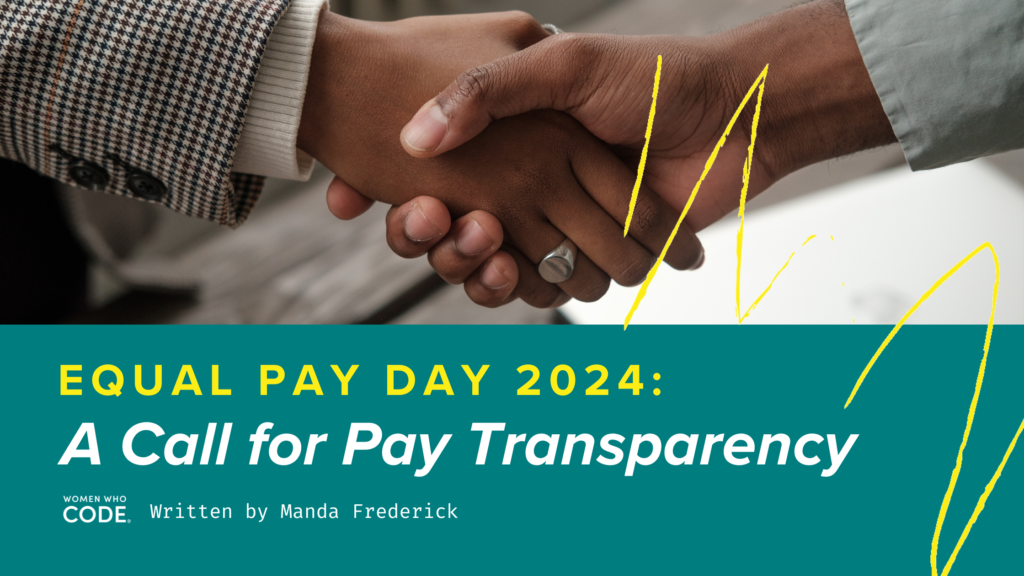Equal Pay Day 2024: A Call for Pay Transparency
Written by Manda Frederick

As we recognize Equal Pay Day on March 12, it is critical to amplify the discussion around wage inequality across industries, including the tech industry, particularly for underrepresented groups. Each year, WWCode and other advocacy groups release reports, personal narratives, and toolkits to help combat pay inequity — and every year, the data is more or less the same, if not worse.
Recent findings, like Hired’s State of Wage Inequality in the Tech Industry 2023 Report, shed light on wage disparities in industries like tech. The report reveals a troubling regression in efforts to address wage inequality, with a significant number of organizations scaling back DEI initiatives aimed at achieving representation and pay equity. This regression exacerbates existing wage gaps, especially for women of color.
Women continue to be underpaid across industries — tech and beyond. According to 2022 US Census data, the wage gap for women compared to men was 84 cents on the dollar for full-time, year-round workers. When considering all earners, including full-time, year-round earners + part-time and part-year workers, the wage gap widens to 78 cents.
The data on gender pay disparities further paint a stark picture of inequality across various demographic groups. Asian American women, for instance, earn 89 cents to every dollar paid to non-Hispanic white men when considering full-time, part-time, and seasonal workers. Similarly, Black women earn 69 cents, and Latinas earn 57 cents for every dollar paid to non-Hispanic white men in full-time, year-round positions, with even lower figures for all earners.
Ideally, a cultural shift would resolve pay inequity across industries. And yet, each year, we ask: “Are women and underrepresented groups worth paying the same for doing the same work as their majority counterparts or not?” The data on pay gaps tells us that, empirically, industries answer, “No.”
What, then, is the way forward?
A Call for Wage Transparency
We improve pay equity by elevating these disparities, bringing transparency to wage gaps and salaries, and holding companies accountable for not doing better year over year.
Advocating for pay equity starts with self-empowerment and education for women and underrepresented groups. But knowing your worth and confidently negotiating your salary, armed with data and insights into industry benchmarks, will only take you so far if you don’t know what your colleagues are being paid for the same work.
A lack of insight, according to Hired, into market compensation puts women at a higher disadvantage in salary negotiations. Their research shows only 25% of women feel adequately equipped to request compensation in line with market rates, compared to 39% of men.

Wage transparency laws have demonstrated a tangible impact, closing and even reversing wage gaps in certain markets — the San Francisco Bay Area witnessed a reversal of the wage gap from $0.95 to $1.02 post-legislation.
However, managers and leaders in the workforce must also commit to pay equity within their organizations. Transparent salary policies, regular pay audits, and unconscious bias training for hiring managers are essential steps toward creating a more equitable workplace. Josh Brenner, CEO at Hired, emphasizes the importance of prioritizing wage transparency, stating, “Even when times are tough, we call on companies to ensure wage transparency within their organizations, regardless of legal requirements.”
Hired’s research also highlights that the “Expectation Gap” significantly contributes to the wage gap for underrepresented groups. When salary expectations are low, lower wages perpetuate, particularly for women.
We must expect more: More pay. More representation. More transparency.
Equal Pay Day gives us an opportunity to ask for more and to elevate the discussion of pay equity. But wage transparency and equity must remain a baseline for discussions about equity in tech and workplaces in general — today and every day.
How to Get Involved on Equal Pay Day and Beyond
Join Women Who Code and organizations like Equal Pay Today to amplify the message of pay inequity. You can:
- Raise Awareness on Social Media
- Follow Equal Pay Day on social media and use the hashtag #EqualPayDay to raise awareness about the wage gap for women and its impact on families.
- Engage in online dialogue using the Equal Pay Today social media toolkit.
- Take Action to Support Legislative Acts:
- Advocate for the Paycheck Fairness Act, highlighting the $400,000 loss over a 40-year career compared to men.
- Encourage Congress to support both the #PaycheckFairnessAct and #SalaryTransparencyAct to address wage disparities and promote pay transparency.
- Educate Yourself: Understand your rights under existing equal pay laws and familiarize yourself with relevant data and statistics on pay disparities. Check out resources like the American Association of University Women (AAUW) and Equal Pay Today.
- Negotiate Effectively: Negotiate your salary confidently during job interviews and performance reviews. Research industry standards and know your worth based on your skills, experience, and qualifications. Practice negotiation techniques and be prepared to advocate for fair compensation. Get help negotiating from WWCode.
- Encourage Pay Transparency: Advocate for greater transparency around salary and compensation within your organization. Encourage your employer to disclose salary ranges for positions and provide transparency in promotion and compensation decisions.
- Lead by Example: As you progress in your career, be proactive in promoting pay equity within your organization. Advocate for fair compensation practices, mentor other women, and support initiatives to address systemic barriers to equal pay.
⬇️ Download the WWCode Talent Toolkit for resources and tools to attract, hire, and retain diverse talent.